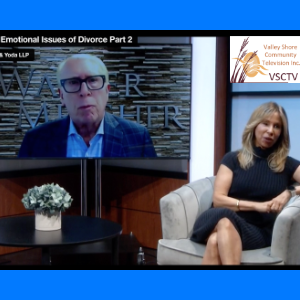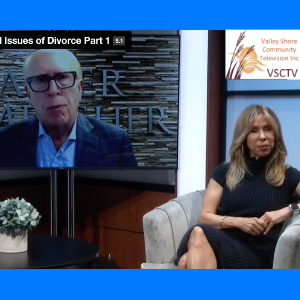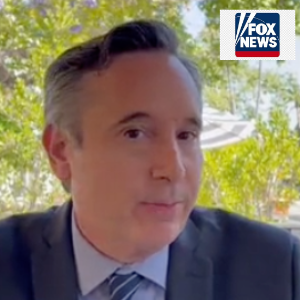
How to Pick the Right Attorney Part 2
[Source: The Weekly Wealth Podcast]
Celebrity Lawyer Christopher C. Melcher, who is ranked as a best family law attorney in California, explains how you can find the right attorney for your specific needs in part 2 of this podcast.
David Chudyk (00:06):
Today we are continuing the second part of our interview with Christopher C. Melcher, a top family law attorney in Los Angeles, California, who is a known as a high profile divorce attorney. He is a partner of Walzer Melcher Yoda LLP, which is ranked as a best family law firm in California. This interview discusses the importance of effective communication and client-centered approach for lawyers, particularly in emotionally charged cases like divorce. Chris Melcher emphasizes the need for lawyers to listen to clients, setting realistic expectations, and providing objective guidance rather than simply advocating for the client’s desired outcome. He also highlights the financial and emotional costs of aggressive litigation tactics, and the importance of finding the right balance between legal expertise and emotional intelligence
Christopher C. Melcher (00:01):
…And so that I do question (solo practitioners charging what larger firms charge) because they’re able to get it paid for it, but without the overhead that we have that supports the client, that gives the client value, that brings muscle to the job you’re paying really all pure profit with the non-staff.
David Chudyk (00:17):
Okay. Yeah, no, that makes a whole lot of sense. So you and I are talking and I would like to work with you. You kind of have a style that seems like works with me and you just almost answered a pretty tough question. Why do you charge so much in a way that makes a lot of sense and I really appreciate that when people, because I’ve always heard that fully 80% of anybody’s earning ability is based on their communication. In other words, how many people pass the bar a lot, how many are very successful lawyers and really most of being a lawyer is being able to communicate negotiations and everything else. So how do you know what you as a client, how your attorney should communicate and how do you find that person?
How a Lawyer Should Communicate
Christopher C. Melcher (00:48):
This is hugely important, David, and I was surprised after doing this so long and I employ lawyers and here at my office I’ve hired lawyers to represent me with them. I mean, this is my thing and I was surprised at how many lawyers can’t speak. I figured, well, you’re a lawyer. You must be, you’re a spokesperson. This is what your job is. At least if you’re a litigator, you are there to represent the client in court, basically selling that client’s position to a judge or to the other side in a negotiation. But we see all these lawyers who can’t talk. It’s absolutely mind blowing. And we have legalese that lawyers learned all these terms in law school and then they throw ’em around. And I think it’s just a way of making them feel better about themselves or making ’em seem like they’re smart. But to me, if nobody can understand you, you aren’t smart and you are not communicating well.
(01:30):
So communication style and effectiveness is super important, I think more than the subject matter because law stuff is not rocket science, honestly. It is really not that complicated. I mean there’s facets of it obviously, but when it comes down to it, most laws are rules of reason. So the answer to most legal questions is what’s reasonable? Well, that’s probably hopefully what the law is. So you want a lawyer communicate and when you’re interviewing the lawyer, you want to be listening to what they’re saying and ask them questions. Are they answering you? Because if they’re not answering you directly when they’re trying to get your business, well they’re certainly not going to listen to you later on. And the questions that they’re answering, do you understand what they’re saying? I mean, we need a lawyer who can understand and if you can’t understand, probably nobody else can either.
Lawyers Should Listen to You
(02:12): So I would keep looking and find somebody that actually is going to listen to you because there’s a lot of lawyers out there who are kind of more paternalistic, I know everything. I’ve seen it before. I’m going to come in there with my tools and fix it and I will tell you what needs to be done. That is absolutely the wrong approach for a lawyer.
We are servants, and I think that that’s what gets misunderstood by people because of our title, because of how much money we’re paid, that they think that the lawyer is in charge, the lawyer is the one who’s going to find all the solutions and tell us all this great wisdom.
The Client is in Charge
No, the client is in charge. The client is the most important person. We listen to the client, we serve the client. And you want a lawyer with an attitude of service, not somebody who’s going to sit here and tell you what to do. And especially in divorce, what I’m seeing is that we have people who are trying to get out of one bad relationship with their spouse and winding up with now an equally dysfunctional and toxic relationship with their lawyer, so you don’t pick somebody who’s just going to tell you how it is, pick somebody who’s going to listen to you and represent you.
David Chudyk (03:04):
So that’s really interesting because what I was thinking is I would really like an attorney that would just say, look, this is what needs to happen based on my expertise, and maybe it would definitely need to be more of a partnership based on what you’re saying. And it’s also interesting, I know that what you’re dealing with is emotionally charged relationships, and I’m sure most divorce cases are not all that complicated if you take the emotion out. But when you put the emotion in, I’m going to take him for everything he’s worth and vice versa. I mean, do you find yourself having to say, yes, we can try to take him for everything he’s worth, but that’s not going to work. So maybe we back down and make it easier? I mean, can you make that suggestion to your client
Christopher C. Melcher (03:36):
So it is highly charged and emotional and the client will be coming in oftentimes feeling that, hey, this is unfair, what’s being proposed or what’s happening to the client. And the first part of this is again, listening to the client because I understand, I need to understand why do you feel that way? What is it about this situation that makes it feel unfair to you? Now, they may come back and say, well, hey, my spouse cheated on me, and why should I have to pay support? Or why should I have to share the children with this person? They cheated on me. And in most cases it doesn’t matter. And so this is really an educational issue for the lawyer and client to say, Hey, I heard what you have to say. I feel badly for you. So I have listened to you. I acknowledge that this is wrong and that you were hurt, but the courtroom’s not the forum to deal with that.
Set Expectations in Court Orders
(04:20):
And what we do in court is make orders for the payment of money or the sharing of time with children. And the affair is not a factor. So what I’m trying to do with those conversations is to educate the client about what the law provides, set expectations for the client to know like, Hey, the court can only do certain things and it’s not here to right every wrong. It’s very limited what you can do in court.
And it’s important for clients to hear that and know that because otherwise they’re thinking because no one’s told them otherwise that they’re going to have some grand day in court and they’re going to stand up and say, he or she cheated on me. And the judge is going to say, oh, wow. Well, if that happened, then we’re going to order this. And that never arrives. And their expectations were never met because they weren’t set properly in the first place.
(04:57):
So I listen and then I educate the client. And so most of the time that’s sufficient. And the client says, Hey, I get that. Okay, let’s work on then what the money order is going to be or what the timeshare is with the children. And they can deal with the emotional hurt separately because it’s not going to be solved in the case.
Avoid Lawyers Who Are Cheerleaders
But, we do see lawyers who are cheerleaders, what I call them to say, yes client, you’re heard, and I’m going to advocate for you. You do not want a cheerleader. You want somebody who’s going to tell you in a surgical manner, this is what you’re facing, these are your options. Here are the risks and benefits of that option, what do you want to do? And allow the client to make an informed choice rather than leading the client down some road that is a dead end.
David Chudyk (05:28):
So you’ve obviously had clients who made the decision that maybe you didn’t want them to make, they chose option A when you thought maybe option B would’ve been a better deal.
Disagreeing on the Legal Approach
Christopher C. Melcher (05:36):
It’s very difficult. Yes. And this is one of the questions I think you would want to be asking a lawyer in an interview is what if we disagree on the approach
(05:43):
Now because, and that’s very insightful and penetrating question because to see how the lawyer’s going to answer that. Now to me, I think I probably want to know, well, what are we disagreeing about? Because if it was like, Hey, let’s defraud the other side or something, it’s like, well, no, I can’t defraud the other side. So that’s it.
But if a question arises of do you want to accept this settlement or go to trial, well, that’s the client’s decision. I would be like, Hey, I’m going to give you all the information if we disagree about it, that’s your choice. I am not the decision maker. It really does depend on the question.
What is the Lawyer’s Approach?
But what I am looking for at the beginning (as a lawyer and what you should be looking for as a potential client), is this going to be a good match? I get clients to come in and say, I want a pit bull.
(06:16):
I want the shark. I want to do this. I scorched earth, all these things and say, Hey, it ain’t me. I have a list of lawyers that do that very, very well. That’s not me. That’s not my approach. My approach is a slow and steady informed, strong. We’re going to be advocating based on the law and the facts, highly protective of you, but not going to attack. And the reason why I do that is that I think litigation is toxic. It is devastating to people. There is an emotional cost involved in it and going around and attacking people unnecessarily doesn’t help any of that. And so that’s not my style. I will go to trial and win if I need to, but there I am also looking out and informing the client of the other cost of litigation. What harm is this going to do to your kids? What harm is this going to do to other relationships? What harm is this going to do to your bank account?
David Chudyk (07:00):
What harm is it going to do to your bill, right? I mean, certain tactics would require more of your time, which even if it makes somebody feel better that they’re fighting harder at $850 an hour, you fight too many hours and you may lose the war and win the battle.
Transparency with Legal Costs & Outcomes
Christopher C. Melcher (07:12):
That’s absolutely right. And that’s usually a conversation I’ve had, especially in these bigger cases where I’ll tell the client right at the beginning, this is going to cost you a million dollars in legal fees. You will easily pay me a million dollars on this case. You are fighting over a million dollars. Pay that to your spouse right now. Make her or him the offer, I don’t want the money. You’re out this million bucks. Either way, pay it to her or him. Get out of the case.
Also, on a smaller scale, had a case right now that the lady gave me a $15,000 deposit, and I’m looking at the case and saying, we are not going to best this offer that your husband’s making. It is just like, we can play with this for a year, but it’s honestly not going to get any better. I would really like to see you make this deal and I will give you the $15,000 back. Don’t spend the money because once we do it, that’s gone. You can’t get that back, but we have an opportunity to save it or return it to you if you make this other choice. And of course, it’s a client’s informed decision to do that, but the lawyer needs to be saying that early, not, Hey client, we did all this. It’s the end of the month. Here’s this big bill. Sorry, it didn’t work out for you.
David Chudyk (08:05):
We fought hard against that guy that you don’t like and that did you wrong. And what’s really interesting is a lot of my job as a financial advisor is almost the same as your job, and that’s to manage clients’ emotions. So when COVID hits and your million dollar portfolio went down to 750,000, hey, let’s talk about is it an emotionally proper response to put all of your money out of the markets? And maybe at some point it is if you’re older and don’t have time for your money to recoup, but in most cases it’s not. And even the emotion, I’m sure even some of your clients, even if they’re wealthy, that sometimes they spend too much money keeping up with the Joneses, and that’s all emotions. So if we can help to manage our clients’ emotions and make logical, rational decisions, I mean, I think you combine that with a little bit of legal expertise and financial planning expertise, and I think that’s the best way to help clients. It’s help ’em get out of their own way.
Christopher C. Melcher (08:45):
That’s right, David. It’s exactly the same thing. It’s the counseling role that a lawyer has and this counseling role that you have. And it’s really coming from a human perspective and understanding like, okay, this is what we can do for somebody technically, and then we can identify that there’s emotional components to that and we can separate those out-It doesn’t help just to react. And the client says, sell. And you’re like, okay, you push the button and sell.
There needs to be a conversation around it because you’ve been through this before. You’ve seen ups and downs in the market. You’ve seen clients sell and then probably the market bounce back twice as hard later on. So you have the benefit of experience, a long-term view, objectivity. It’s not your money that’s at risk there, so you’re able to be objective about it. It should be the same thing for a lawyer, and this is where I think when you’re selecting somebody, whether it’s financial advisor or an attorney, is to have somebody who’s balanced. Because if the person that you’re relying on for advice and counseling is messed up themselves, you’re not going to be led into the right place.
©2025 The Weekly Wealth Podcast. No claims made to copyrighted material. Aired 7/6/21.






